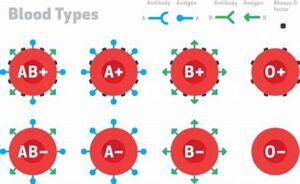Read time 6 minutes
This blog is another opportunity to feel grateful. Thank you, dear Universe, you continue to bless me with recovery and health.
Post getting diagnosed with rare and chronic diseases I became inquisitive about what my blood group A positive (+) could say about healing.
I was diagnosed with a rare disease called Isaacs’ Syndrome. Isaacs’ is a neuromuscular health condition that stems from muscle hyperactivity. In the process, I also discovered that I had Lyme disease. Lyme is a bacterial illness that gets transmitted through ticks. Glaucoma also accompanied me. Glaucoma is an eye-related disease that damages the optic nerves. And Membranous Glomerulonephritis is a progressive kidney disease. I faced tremendous issues with my gut, stomach acid, and digestive enzymes. I also developed Irritable Bowel Syndrome (IBS), Diabetes, and Blood Pressure.

I had little idea that even our Blood Group could make us receptive and even resist certain diseases.
Stay with me to find out more……..
Though, blood groups may not directly affect rare diseases but could influence vulnerability. Blood groups have also been a subject of scientific curiosity due to their impact on individuals’ lives. Understanding these relationships can prove its importance for supportive reasons. There are many factors and thus this study continues to reveal fascinating insights. It continues new revelations into diseases, evolutions, and genetic disorders and helps research and development of science.
Understanding Blood Groups a Little Better
Blood groups are categorized on the absence or presence of certain antigens in blood. These antigens could be proteins, glycoproteins, carbohydrates, or glycolipids. These antigens play a crucial role in medical treatments.
The two most significant blood group systems are the Rh system and ABO system. The Rh factor determines the type, whether a person is positive (+) or negative (-). The main blood groups are A, B, AB, and O. Each one of them has their unique antigen properties.
Let’s understand the key blood group systems, ABO system, and Rh factor:
ABO System:
The ABO system categorizes blood into four main groups:
- Group A: has ‘anti-B antibodies’ in the plasma and ‘A antigens’ in the red blood cells.
- Group B: has ‘anti-A antibodies’ in the plasma and ‘B antigens’ in the red blood cells.
- Group AB: has both ‘A and B antigens’ in the red blood cells. It belongs to the universal recipient category.
- Group O: has both anti-A and anti-B antibodies in the plasma and ‘no antigens’ in the red blood cells. It belongs to the universal donor category.
Rh Factor
- It is a protein, and the full form of the Rh factor is the Rhesus factor.
- It can either be present (+) or absent (–).
Q) How do we derive the common blood group types?
After combining the ABO system and Rh factors, we derive the eight most common blood types: A+, A-, B+, B-, O+, O-, AB+, and AB-.
Q) Name the blood type that is a universal donor and recipient.
Generally, universal donors have O negative (-) blood type. It can be used for immune-deficient infants and emergency transfusions.
Q) Name the universal recipient who can receive blood from any type.
AB positive (+) blood type.
Q) Which is a rare blood type?
As per statistics, AB negative (-) is quite uncommon.
Unveiling Clues for Better Healing through Blood Groups

A Blood group’s ability to genetic variations can provide insights into an individual’s response to treatments or medications. These variations can affect the antigens in the blood and the presence of certain enzymes. This can influence how a person responds to drugs and diseases.
Pharmacogenetics is the study of genetic differences in drug response. It shows how due to genetic makeup, some people process drugs slowly. On the contrary, others may metabolize medicines quickly.
Additionally, certain health conditions can be associated with some blood groups. For example, for A positive (+):
Research shows that certain blood groups are more receptive to specific diseases. It is important to understand that having a particular blood type does not guarantee any health condition. Understanding this relationship makes things easier as there may be certain correlations.
- Autoimmune Diseases
- Infections
- Cardiovascular diseases
- Cancer
In the case of organ transplantations, mismatched blood can lead to risks associated with severe forms of rejection.
To conclude, it is important to understand an individual’s blood group both for the healthcare providers and the patients. It helps predict their response to medicines and treatments. Also, it assists in assessing their risk for certain diseases.
Blood group compatibility is a critical aspect. It especially helps in areas such as organ transplantation and transfusions. Generally, universal donors have O negative (-) blood type. It can be used for immune-deficient infants and emergency transfusions. AB positive (+) blood are universal recipients. It becomes critical to ensure compatibility between recipients and donors to mitigate immunological problems.
Personalized Medicines is a revolution in the holistic healthcare system.
It is also known as precision medicine, a model that is tailored to an individual’s needs for diagnosis, treatment, and disease prevention. It utilizes information derived from the genetics of a person to make informed decisions. It is personalized medicine that denies a one-size-fits-all approach to effective prevention, treatments, and medicines.
Exploring the Link Between My Blood Group A Positive (+) and Other Parameters of Life
Research has explored various aspects of life that may correlate with blood group A positive (+):
Personality traits:
There is no scientific proof that certain personality traits can be linked to a blood type. It is a theory and is a clue for people who believe it.
People with blood type A positive (+) are generally responsible, patient, stubborn, tense, reserved, creative, and sensible.
To conclude, the above personality traits match that of mine.
Disease Vulnerability:
Certain blood groups are more receptive to specific diseases. It is important to understand that having a particular blood type does not guarantee any health condition. Understanding this relationship makes things easier as there may be certain correlations.
- Autoimmune Diseases
- Infections
- Cardiovascular diseases
- Cancer
To conclude: I am highly prone to infections and have autoimmune diseases. The exact mechanisms behind these associations are still being researched, and more studies.
Dietary Preferences:

Some studies suggest diet preferences for Blood Groups. The concept of Blood Group diets was popularized by Dr. D’Adamo.
For Blood Type A positive (+):
Natural and Vegetarian diets are recommended. It is because they have low levels of digestion due to lower levels of stomach acid. For such people, a non-vegetarian diet becomes difficult for digestion. Please note that scientific evidence supporting the claim is lacking. However, the claim matches my preferences. My digestion is weak and easily digestible food has always been recommended. My stomach and health feel happier eating more fruits, vegetables and easily digest food.
Considering the connection between various aspects of life and one’s blood group can be interesting.
Conclusion
Blood groups are categorized on the absence or presence of certain antigens in blood. These antigens play a crucial role in medical treatments. The two most significant blood group systems are the Rh system and ABO system. The main blood groups are A, B, AB, and O.
Blood Groups can make us receptive and even resist certain diseases. Though, they may not directly affect rare and chronic diseases but could influence vulnerability. Understanding these relationships can prove its importance for supportive reasons.
As per some studies, each blood type carries unique characteristics that can influence certain factors. Including nutritional needs, personality traits, and disease risk.
Knowing your blood group could prove beneficial for both health and personal reasons. It includes medical emergencies, transfusion safety, childbirth, health awareness, and community contribution.
It’s a small piece of information with significant importance for yourself and others.
Though it’s great to learn about the general implications of blood groups but it doesn’t replace personalized advice from a healthcare professional. It’s always advisable to seek the guidance of a doctor or a qualified health expert.
DISCLAIMER
The views expressed above in this article are the author’s own and do not represent any kind of medical advice.
Reference
Blood Types: Main Groups, Most Common, and Rarest (verywellhealth.com)


